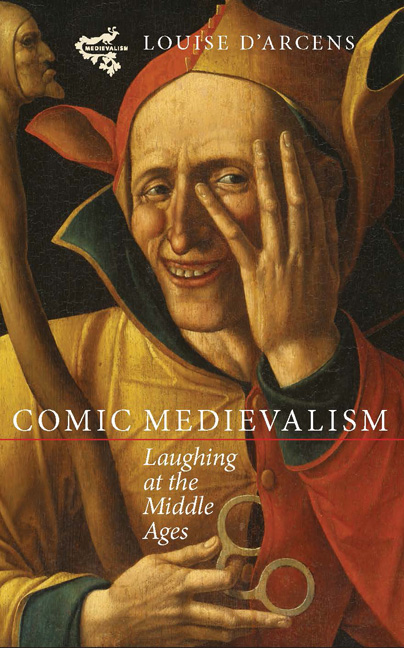Book contents
- Frontmatter
- Dedication
- Contents
- Illustrations
- Acknowledgements
- I THE SET UP
- II OLDIES BUT GOODIES: COMIC RECOVERY
- 2 Scraping the Rust from the Joking Bard: Chaucer in the Age of Wit
- 3 Medievalist Farce as Anti-Totalitarian Weapon: Dario Fo as Modern Giullare
- III HIT AND MYTH: PERFORMING AND PARODYING MEDIEVALISM
- IV THAT'S EDUTAINMENT: COMEDY AND HISTORY
- Afterword: Laughing into the Future
- Bibliography
- Index
2 - Scraping the Rust from the Joking Bard: Chaucer in the Age of Wit
from II - OLDIES BUT GOODIES: COMIC RECOVERY
Published online by Cambridge University Press: 05 November 2014
- Frontmatter
- Dedication
- Contents
- Illustrations
- Acknowledgements
- I THE SET UP
- II OLDIES BUT GOODIES: COMIC RECOVERY
- 2 Scraping the Rust from the Joking Bard: Chaucer in the Age of Wit
- 3 Medievalist Farce as Anti-Totalitarian Weapon: Dario Fo as Modern Giullare
- III HIT AND MYTH: PERFORMING AND PARODYING MEDIEVALISM
- IV THAT'S EDUTAINMENT: COMEDY AND HISTORY
- Afterword: Laughing into the Future
- Bibliography
- Index
Summary
In 1694, the young Joseph Addison, later a playwright, essayist and notorious strander of prepositions, published ‘An Account of the Greatest English Poets’ in the fourth part of John Dryden's Miscellany Poems. A verse account of the visitation of the Muses (‘the Tuneful Nine’) to writers of ‘British Rhimes’ past and present, it nominates Geoffrey Chaucer as the first great poet in the English tradition:
Long had our dull Fore-fathers slept Supine,
Nor felt the Raptures of the Tuneful Nine;
Till Chaucer first, a merry Bard, arose;
And many a Story told in Rhime and Prose.
But Age has Rusted what the Poet writ,
Worn out his language, and obscur'd his Wit:
In vain he jests in his unpolish'd strain
And tries to make his Readers laugh in vain.
Despite alighting only briefly on Chaucer's encounter with the Muses, Addison's account is densely packed rhetorically and conceptually. In a few lines it discloses much about the conflicted way in which the late medieval poet was regarded, both as a comic writer and as an early English writer, in the ‘long eighteenth century’, a period spanning the late seventeenth century through to the end of the eighteenth. It contains a number of conceptual contradictions which, as will be explored throughout this chapter, reflect the variable nature of Chaucer reception throughout the so-called ‘Age of Wit’.
- Type
- Chapter
- Information
- Comic MedievalismLaughing at the Middle Ages, pp. 43 - 67Publisher: Boydell & BrewerPrint publication year: 2014



